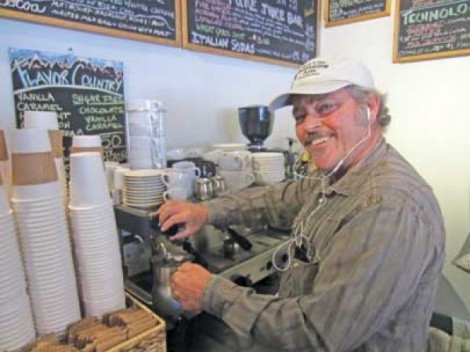
For Dana Williams, music and politics have always been deeply intertwined. Williams, the Park City mayor now approaching his 10th year in office, is a down-to-earth man who works at Alpine Internet Coffeehouse in the Kimball Art Center when he’s not performing his mayoral duties or playing with his band of 18 years, Motherlode Canyon Band.
Williams was pulling a double when I swung by to interview him. Though our conversation was frequently interrupted as he made skinny lattes and the like, it didn’t stop Williams from speaking openly and articulately about everything from current Park City issues to the music that has shaped his life.
Williams grew up during the 1960s, arguably the most tumultuous political time in the United States. Although Williams came from a family of accomplished pianists, he identified more with the folk artists whose music interacted with the changing political and social climate. His beloved first-grade teacher, “one of the original hippies,” taught him guitar lessons after school, and he’s been playing ever since. Williams played in his first band in high school, and for graduation, that band played “Tommy” by The Who. “We totally screwed it up,” he says, “but it didn’t matter—it was a lot of fun.”
Of all the ’60s-era musicians, those from San Francisco—the Flower Power movement’s epicenter—were the most radical and were Williams’ favorites. For Williams, the Grateful Dead, Jimi Hendrix, Jefferson Airplane and Big Brother & the Holding Co. were the voices of a new generation, the soundtrack to what was going on in the world.
Although many 21st-century musicians are seen as more apathetic than active when it comes to current issues, Williams says, “There are more and more bands that are out there that think the message is important again.” Williams sees Michael Franti and some hip-hop artists as the soundtrack to the current generation growing up. They are the kind of musicians who are “trying to use music to change the world.”
Beyond a means to comment on political issues, Williams now sees music as a kind of escape. It gives him some release from the stresses of working as a government official, he says.
While he’s obviously a world-class multitasker, one person can only do so much. How does he balance his busy schedule? He laughs and says, “I have a lot of balls in the air and, once in a while, they all drop.”
Williams is passionate about making his city a better place, providing more affordable housing for the resort town’s workforce and making sure that the Utah Legislature understands who the people of Park City truly are—not “this ongoing perception that we’re a bunch of rich people who live in 10,000-square-foot houses. That couldn’t be further from the truth,” he says, citing statistics that 25 percent of the city’s population is Hispanic and 40 percent don’t have health insurance.
Performing with the Motherlode Canyon Band allows him some catharsis. He’s fond of saying, “You get yelled at five nights a week, and two nights a week you [get to] yell back.” But more than that, Williams loves being onstage and looking out over a crowd of his constituents who are all having a good time.
“You’re playing ... and you see two or three generations of people out dancing, and you know them all,” Williams says. “They’re in your town. So there’s something that’s very special about being able to do it all.”
